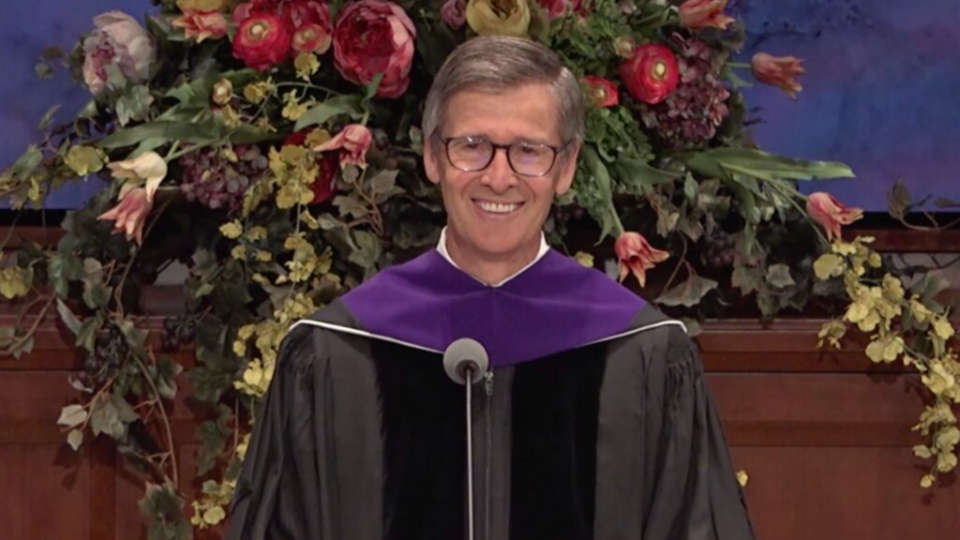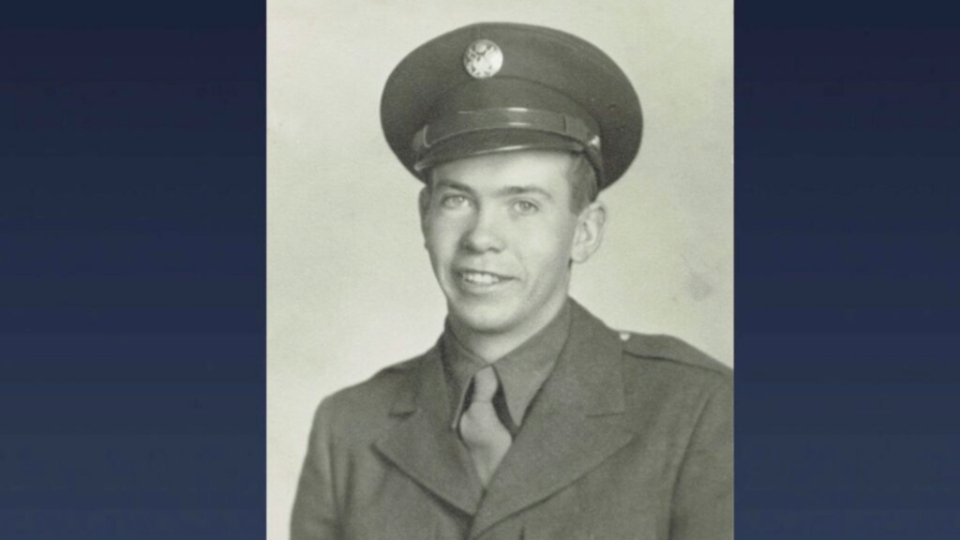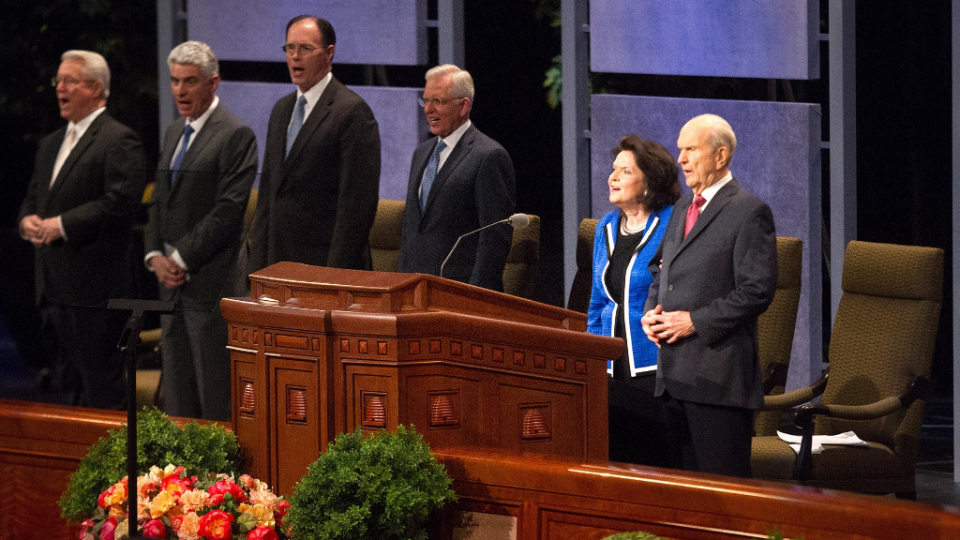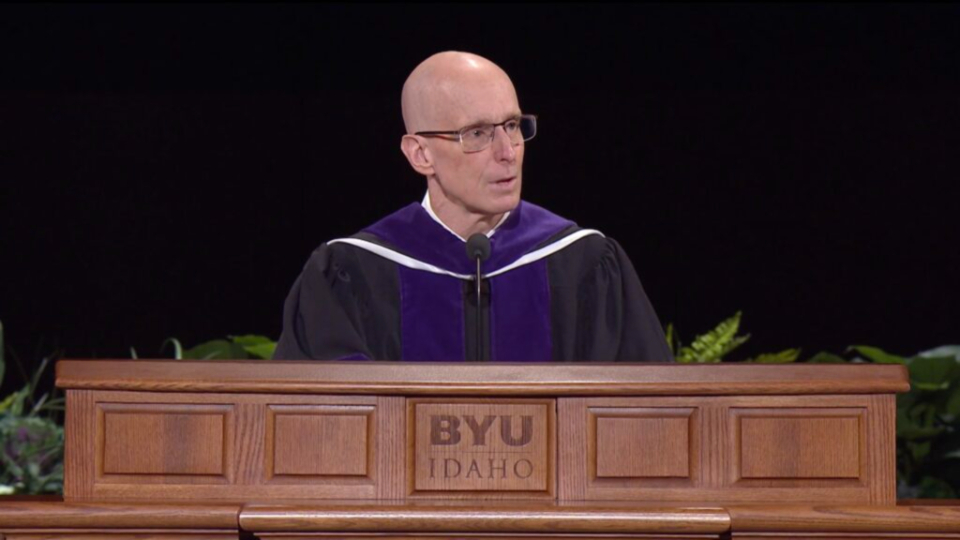
Lund-Commencement
Young Men General President Steven J. Lund speaks during the broadcast of BYU–Idaho’s spring commencement on Wednesday, July 21, 2021. Screenshot courtesy of Church News.All rights reserved.This story appears here courtesy of TheChurchNews.com. It is not for use by other media.
By Rachel Sterzer Gibson, Church News
Virgil Spade was a Latter-day Saint who served as a tail gunner during World War II. Once, when flying a mission over Europe, his plane came under enemy fire and the wing burst into flames. Spade released his seat harness and reached for a parachute just as he was blasted out of the exploding plane. As he accelerated toward the ground, he found in his hand the strap of the parachute he had been reaching for.
In speaking during BYU–Idaho’s spring commencement broadcast on July 21, Young Men General President Steven J. Lund compared graduates being launched into the career world to Spade’s experience being shot out of an airplane.
“The world you have known at BYU–Idaho is already arching toward the horizon in blazing glory as you are suddenly finding yourselves on a different trajectory, with the world below getting larger by the moment,” he said.
President Lund reassured the 2,711 graduates that they are well prepared for this day.
In Spade’s case, he was able to quickly clip into his parachute and survival kit and make a safe landing, buy a horse and ride it all the way to rescue and “happily ever after.”

Lund-Commencement
Young Men General President Steven J. Lund shares a photo of Virgil Spade, a Latter-day Saint who served as a tail gunner during World War II, during the broadcast of BYU–Idaho’s spring commencement on Wednesday, July 21, 2021. Screenshot courtesy of Church News.All rights reserved.“Your story as you depart this place of relative calm will probably have moments that will seem just as dramatic, as you hurl through the atmospherics of unknown and unknowable futures,” President Lund said. “And because of your particular heritage, they will be futures filled with transcendent purpose that will call to you in unexpected ways to do things not often known among mankind.”
When President Lund was graduating from college, he faced a deep recession with high unemployment and 18% mortgage interest rates. Today’s graduates are confronted with post-pandemic society, high housing costs and a disrupted economy.
Fortunately, this is not the first time they have taken a leap of faith into the unknown, President Lund told listeners. In the premortal world, they chose to come to a fallen world “where we could learn things we could not learn otherwise.”
“We intentionally rode our then unassailable faith in the Savior into this fallen world, and, as we continue to respect our premortal identities, we will carry it with us into our promising futures,” President Lund explained.
The Lord appeared to Moses when he was learning his trade as a shepherd, President Lund continued. He showed Moses an extravagant display of His creations and then pronounced, “I have a work for thee, Moses, my son” (Moses 1:6).
“He kind of said to Moses, ‘You think you are a shepherd. And that is a noble profession. It’s honest work. But you are, first of all, my son, and I am the God of creation. I am showing you the works of my hand to introduce you to the family business … to bring to pass the immortality and eternal life of man. This is the work I have for you to do.’”
President Russell M. Nelson has invited all to participate in the work of salvation and exaltation that Moses was invited into when he was sent to gather Israel, President Lund continued. “President Nelson makes it easy to understand. He said, ‘Anytime you do anything that helps anyone — on either side of the veil — take a step toward making covenants with God … you are helping to gather Israel. It is as simple as that’” (“Hope of Israel,” worldwide youth devotional, June 3, 2018).
The underpinnings to life involve loving God, which means loving whom He loves: each other, President Lund said. “He loves us. Now He asks us to love Him back by taking care of each other.”
President Lund told graduates they have gained more from their university experience together than they know. “We have entered a fallen world occupied by powers and threats that are hostile to the purposes of our mortal mission. But like Brother Spade, we have everything we need.”
BYU–Idaho students have the advantage of adding a supply of spiritual knowledge and understanding into their survival kit. “This understanding will be helpful in more places than Sunday School. It may largely inform the purpose and passions of your life,” President Lund said. “Do not ditch these insights with your parachute when you pass into perilous precincts. They were placed into your hands precisely for times like these.”

Lund-Commencement
President Russell M. Nelson of The Church of Jesus Christ of Latter-day Saints sings with his wife, Sister Wendy Nelson, during the worldwide youth devotional at the Conference Center in Salt Lake City, Utah, on Sunday, June 3, 2018. Photo by James Wooldridge, courtesy of Church News.Copyright 2021 Deseret News Publishing Company.President Nelson said in 2018 — and has reaffirmed many times — “you were sent to earth at this precise time, the most crucial time in the history of the world, to help gather Israel. There is nothing happening on this earth right now that is more important than that.”
When the prophet first said it, President Lund noted, the world was heading toward a pandemic and burdened with debate over economic and social justice, diminished by racial inequities, facing environmental decline. Yet the prophet weighed these competing concerns and found them all to be subordinate to “the gathering of Israel.”
“This does not mean we as members of Christ’s Church can disregard the issues of the day,” President Lund said. “But given the godly business we are about, it does mean this: If our passions about any other cause separate we of the covenant from each other or from our divine, covenantal mandate to be about God’s work, then we are out of balance. Whether our passion is about our vocation or scholarship or politics or any number of good causes, if it separates us from each other or from our prophetically encouraged role, then we are about lesser things. The best way to improve planet earth is to prepare for its redemption. That is the very intentional work of the brand of faith that brought us here.”
President Lund promised graduates their lives will be filled with joy and abundance. “And when you and I may find ourselves or others occasionally in free fall, know that we have within our grasps a divine parachute. We will do well to attach ourselves to the Savior’s Atonement early and often by building faith in Him, learning of Him, praying to the Father in His name and by the practice of connecting your passions with His in going about His work.”
The Savior’s life involved detours into the lives of others in need. “This too can be our legacy as we journey through the world into which our faith has hurled us. As we each depart here into careers of impact, let us establish the same priorities He did at the front end of his career,” President Lund encouraged.
The Savior’s first recorded words expressed a bold and instructive mission statement. When questioned about why He had left the path of the caravan to go quietly into the temple, He explained, “I must be about my Father’s business” (Luke 2:49).
As he addressed graduates, BYU–Idaho President Henry J. Eyring highlighted the important scriptural directive to “stand” — stand and be not moved, stand in the holy places, stand fast in the faith, stand in thy lot at the end of thy days.

Lund-Commencement
BYU–Idaho President Henry J. Eyring speaks during the broadcast of BYU–Idaho’s spring commencement on Wednesday, July 21, 2021. Screenshot courtesy of Church News.All rights reserved.Mortal beings are subject to the physiological tendency to respond to danger by fighting or flying, President Eyring noted. “But our immortal heritage provides a more courageous option: to stand. We can stand on revealed gospel truths. We can stand in our assigned places in our families and in the Church. We can stand where and how the Spirit directs while listening for His guidance. And we can stand selflessly, serving in ways that may never be known.”
Prior to his remarks, President Eyring noted that of the 2,711 graduates, 2,153 earned bachelor degrees, 611 earned associate degrees, and 900 were online students. More than 800 of graduates began as BYU–Pathway Worldwide students.
Copyright 2021 Deseret News Publishing Company